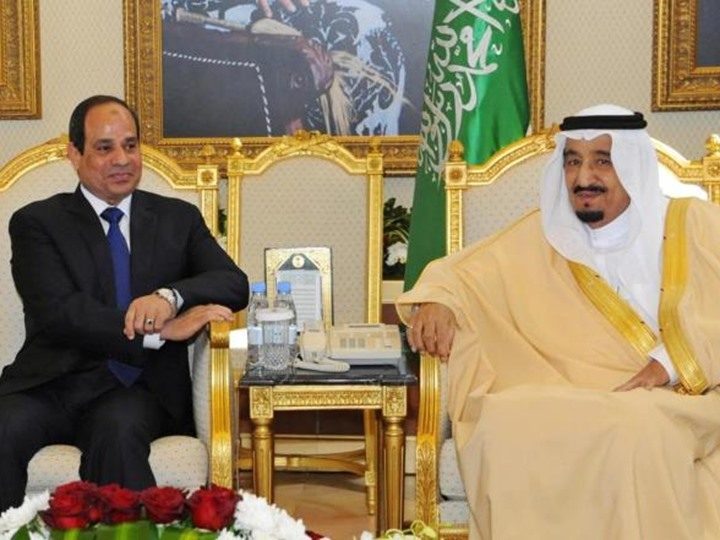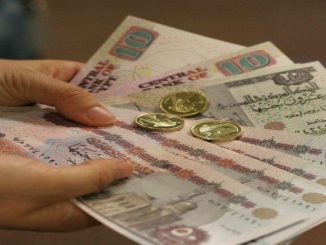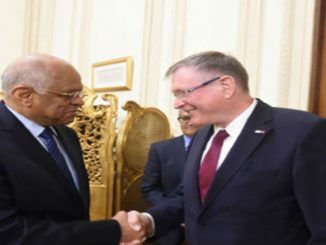
Egypt eyes to secure a new deposit from Saudi Arabia worth $2-3 billion as part of about $6 billion in bilateral financing required to secure an IMF loan, the finance minister said in comments published by Al Borsa newspaper, reported Reuters.
Borsa quoted Amr El-Garhy as saying that negotiations with Saudi Arabia were due to be completed in the few weeks.
The executive board of the IMF, the Washington-based lender, will not consider the loan, until Egypt secures up to $6 billion in commitments from bilateral creditors mainly Gulf friends as mentioned before by the IMF managing director Christine Lagarde.
The Future of the Saudi Investments in Egypt
Saudi Arabia has been Egypt’s most generous supporter since July 2013. Aid in the form of governmental grants but the Saudi government’s grants and financial aid deposited previously to the Egypt’s Central Bank directly have come to an end when the Saudi’s support suggests a new trend. Accordingly, money shipped to Cairo is coming as investments and loans. However, lately, even these investments in Egypt are facing many challenges.
Last month, reports that mentioned that Saudi Arabia is about to halt some of its projects with nearly 20 billion dollars- which is a blow to the Egyptian economy that has already been suffering from a decline in foreign investments.
Some experts say that the Saudi investments which are supposed to be pumped in Egypt will shrink as a result of the internal economic crisis in the kingdom due to the decline in oil prices, reported Bloomberg.
There is no doubt that the decrease in the Saudi investments will have negative repercussions on the Egyptian economy. Ezz AL-Deen Hassanein, an economic and banking analyst, said that the Saudi investments are nearly$23 billion in different economic areas. The industrial and food production are on top of these projects, then comes the construction sector in the second place, followed by the tourism investments in the third place, and the agricultural sector in the fourth place. There are also other investments in the services sector, telecommunications, and information technology, according to Al-Mesryoun.
Hassanein added that “Saudi Arabia is currently experiencing a sharp decline in its oil resources, representing almost 75% of the Kingdom’s revenues, which was reflected in the state’s public budget and has caused a major deficit.”
He continued, “The Kingdom is also looking forward to shrinking the domestic investments inside the country, in addition, it will adopt some measures that will help to increase the resources, including cutting gasoline subsidies for expatriates and foreign residents, and imposing the value added tax by 5% starting from 2018.”
“Accordingly, all the Kingdom investment plans will be pending temporarily until there is an improvement in the prices of oil, the war in Yemen which is exploiting a lot of money, and also the Syrian crisis, where Saudi Arabia supports many parties against the Syrian regime.”
In this context, Hassanein predicts that the Saudi investments will be delayed during the coming period. For his part, Mohamed AL-Shenawy, an expert in stock market, said that Saudi Arabia has already started to decrease its domestic investments, mostly in the infrastructure, and expansion projects especially King Abdullah’s economic city due to the crisis it endures in Yemen war and the decline in oil prices which have caused a fiscal deficit in its budget. He added that “Egypt will be affected indirectly by reducing the investments across the Kingdom as the remittances from Egyptians abroad will probably decline which will increase the shortage in foreign currency.”
In fact, Saudi Arabia along with U.A.E. and Kuwait, have poured billions of dollars to support al-Sisi regime after he led a military coup in 2013 against Egypt’s first democratically elected president Mohamed Morsi. Egypt has received more than $20bn in aid from Gulf countries since then. But according to some analysts, the relation has cooled if it won’t completely stop.
Steffen Hertog, an associate professor of comparative politics at London School of Economics, said “For the Gulf, Egypt is too big to fail, however, diminished its regional status,” said. At the same time, their relationship “has clearly cooled,” he added, saying the money is likely to be given with strict conditions attaché.
Egypt can no longer take unconditional Gulf support for granted, analysts said. Saudi Arabia, for one, has been increasingly offering loans and investments instead of grants.
Sarah Yerkes, a visiting fellow at the Brooking Institution in Washington, said: “Sisi’s popularity is declining, pretty dramatically, and the economy is showing no signs of improving, so the U.A.E. and Saudi are likely discussing whether Egypt is worth their investing.”
In this context, Will Saudi Arabia inject new financial aid while struggling with its own budget worries amid falling oil prices, or will it be unwilling to support Egypt’s al-Sisi as before?
The Saudi-Egyptian Relations: Dormant Volcano
Despite the open-ended expectations and that Saudi Arabia as well as other Gulf countries won’t allow Egypt to fail, there is no doubt that the Saudi-Egyptian relations nowadays are like a dormant volcano that might erupt at any time in the near future.
In his meeting with Emirates’ Foreign Minister Abdullah Bin Zayed, al-Sisi said, “If any Arab country was subjected to any aggression, Egypt won’t hesitate to present any kind of assistance.”
Al-Sisi’s words were repeatedly stated throughout the past three years as the Gulf countries were among the major supporters of the military coup in Egypt.
However, al-Sisi is repeating these words again amid fears of the decline in the Gulf states’ support to the al-Sisi regime.
The Gulf countries and Saudi Arabia, in particular, started to realize that the actual Egyptian role is not useful, especially with the growing Iranian threat in both the North and the South fronts.
The Houthi militants are bombing Saudi cities in the south, and there are several attempts to attack the Saudi borders, so, “Aren’t these actions considered a real aggression on an Arab country as al-Sisi claims?!!”
Moreover, the Egyptian stance towards the Syrian crisis is divergent from the Saudi stance. Despite Bashar al-Assad’s relations with Iran and Shi’ite militias which represent a real threat to Saudi Arabia and Egypt, yet the Egyptian regime is still backing a political solution to the Syrian crisis. On the contrary, Saudi Arabia supports a military solution to the crisis and calls for toppling Al-Assad’s regime.
Even recently when some Shi’ite leaders attacked Saudi Arabia and directly threatened the Kingdom, the Egyptian regime didn’t even condemn the action or announce its support to Saudi Arabia.
In addition, when Saudi Arabia was subjected to a strong political attack from Iran, the Egyptian authority stood still and didn’t react. There was also some political harassment that calls to oust Saudi Arabia from supervising the holy sites in Mecca and al-Medina regarding al-Hajj and al-Umrah (religious rituals and duties), there was no official statement from Egypt in this regard, which was obviously weird.
Even the Arab League or its Secretary General has not issued any statement until now despite the dangerous attacks against the Sunni Arab kingdom that faces regional sectarian threats.
The Arab League has only issued a frail hesitant statement by the deputy secretary general, but at the same time, the secretary-general was keen to issue an official statement on the political situation in Nicaragua. Is the Saudi issue less important than the situation in a Latin American country?
In the same context, Grozny Conference in Chechnya, which was initiated by the Yemeni scholar Ali al-Gafry- close to the Egyptian agencies and high-ranking officials to redefine Ahl al-Sunna wal-Jama’ah term, has increased more suspicions. Egypt’s religious official institution has participated in the conference with all its entities and figures as Al-Azhar, the Endowment, the Grand Mufti as well as the al-Sisi’s official counselor and the former Mufti. In addition to their attendance, AL-Azhar’s participation in the conference has caused unprecedented outrage among the Saudi circles in protest against excluding the Salafists from Ahl- al-Sunnah’s definition when the Grand Imam of Al-Azhar Sheikh Ahmed al-Tayeb enlisted those who are included in this term during the conference.
The conference aims to isolate Saudi Arabia religiously and politically as the Saudi religious institutions and scholars weren’t invited to the conference.
Moreover, the conference has also accused the Saudi kingdom and its ideology with fueling extremism which are in fact dangerous accusations to the kingdom and a stab in the back from a close ally as Egypt at the time Saudi Arabia faces many threats from Iran and its arms in Syria, Iraq, Lebanon and Yemen.
In the same context, in an interview with Iranian Fars News Agency, Dr. Ahmed Kerema, a professor of Islamic Sharia (Islamic Law) at Al-Azhar University attacked the Saudi operations in Yemen on an Iranian media!
Dr. Kerema said, “The fighters from UAE, Saudi Arabia, and the Arab Coalition, who are killed in Yemen, are aggressors and they will go to hell.” On the other hand, he said,” The dead Yemeni people, who are the helpless aggrieved party, are the martyrs,” Kerema said stressing that this is a “fatwa” (certified religious opinion) from Al-Azhar, and from him.
Dr. Kerema also defended Grozny Conference which was held at Chechnya. The Conference and its participants were accused of treason for excluding the Salafists from Ahl- al-Sunnah’s (Components of Sunnah -those who adopt the real traditions of Prophet Mohamed and adhere to his teachings, uniting upon them- a controversial issue over the Islamic ages).
Kerema defended Grozny conference saying,” Ahl- al-Sunnah conference was held to adjust the term that was lured by the Salafist Wahhabis, who claimed that they are alone the only Sunni Community.”
He also defended excluding the Salafist Wahhabism from the term of Ahl-al-Sunnah saying that Wahhabism is the core of violence and unrest in our world and “If the world seeks to eradicate the sources of terrorism, it has to stand decisively against Wahhabism.”
When Dr. Kerema was asked why Saudi Arabia religious institutions were not invited to Grozny Conference, he said that “Frankly speaking, the countries of Central Asia have endured from the Wahhabist ideas for destroying their youths’ mentality.” He continued, “They made their youth the main fuel of terrorism and terrorist operations.” Kerema also opened fire on the Saudis “fatwas”, accusing them of destructing Yemen, Iraq, and now Syria.
Many Saudis refuse to assume that all these moves have occurred away or against Egypt’s political will. Accordingly, Saudi circles, who were once supporters of the al-Sisi regime, protested against Egypt’s participation in the conference as well as excluding the Salafists from Ahl- al-Sunnah’s definition when Al-Azhar Grand Imam enlisted those who are included in this term during the conference. As a result, a well-known Saudi writer called to leave Al-Sisi “to face his fate,” for taking the decision to participate in this conference.”
One of the prominent comments on the issue was that of Mohammed Al Ash-Sheikh, a famous writer, who said on Twitter, “The participation of the Grand Imam of Al-Azhar in Grozny Conference, which excluded the Saudi Kingdom from the definition of Ahl al-Sunnah requires to change our treatment with Egypt.”
He added, “Our nation is more important and let Egypt of al-Sisi go to ruins.” He continued, “We were supporting al-Sisi because our joint enemies were the Muslim brotherhood (MB) and the pro-MB Salafis.” Al Ash-Sheikh said that after Sisi showed ingratitude in Grozny, “he should face his fate alone”.
Al Ash-sheikh said that the conference “clearly targets the Kingdom”, accusing the Russian and Iranian Intelligence of standing behind the conference to “exit the Kingdom out of Ahl Al Sunna. He ended his comment saying, “I have disagreed with the extremist and I had enough from them but if the case is related to the nation’s underestimation and marginalization, I will turn to the greatest hardliner because the nation is a case of life or death, according to my criteria.”
On the other hand, the well-known academic Mohamed Abdullah Azzam said on Twitter, “The former Grand Mufti Aly Gomaa was tutored by Sheikh Hamud Al-Tweirgy and he has been generously treated by the Saudis Scholars … however, I am astonished at the silence of al-Sisi supporters in Saudi Arabia toward the Chechnya Conference treason. He added that after the Kingdom’s enormous projects in al-Azhar, the Grand Imam of Al-Azhar is awarding Saudi Arabia through engaging in a coalition with Putin to expel the Kingdom out of the Islamic world.
In the same context, Khaled al-Dakheel, a well-known political researcher at Al-Hayat newspaper, said on his Twitter account, “Egypt’s stability is a Saudi and Arabian interest but al-Sisi’s political commitment is still suspicious, “He also that al-Sisi came to power by a military coup but he insists on calling it a revolution. Al-Dakheel also said, “I was never convinced that al-Sisi has the ability and the wisdom to lead Egypt in this critical situation , as his reign is the worst since the death of Abdul Nasser as said by the Egyptians.”
Egypt overlapping interests and the Saudi choices
Some might say that Al-Sisi’s administration regarding the Gulf countries reflects how hesitant is his ruling , but this regime since its establishment by a military coup in 2013 has been trying to ally itself with many countries to gain legitimacy even if those countries have contradictory agendas or even rivals to one another.
Egypt depended on the Gulf aid to recover its economic problems but at the same time, al-Sisi came closer than before to Russia which is a key supporter of the al-Assad regime and a strong ally to Iran – the main traditional enemy to Saudi Arabia. It seems that Al-Sisi has chosen from day one to play with all the rival actors to gain all the benefits that strengthen his power regionally and internationally. However, this policy would not be effective forever as the situation could reach a point where an explicit decisive action should be taken or else any of al-Sisi’s allied parties would consider this a betrayal to their favors to his illegitimate regime.
Accordingly, having a strong partnership with Saudi Arabia couldn’t align with strong relations with Moscow as both countries have opposite rival policies on different issues as counter-terrorism for example . In Syria, Russia is fighting the opposition groups (considered terrorists by Russia) but these groups are backed and supported by Saudi Arabi in their fight against Bashar Al-Assad. However, al-Sisi regime has recently allied closely to Russia to seek military aid and reach arm deals crucial to Egypt in its war in Sinai against Sinai province (a group affiliated with the Islamic State). As well as the al-Sisi regime aims to revive the Russian tourism to Egypt after it was banned after the Russian plane downed in Sinai last year.
That’s why al-Sisi regime didn’t reject Grozny conference despite its threat to Saudi Arabia and the well-known- Russian and Iranian role in supporting the conference to isolate Saudi Arabia and contain its influence from the Islamic world.
In fact, Grozny conference is a hidden bomb that seems religious but it has political, economic and social effects that would probably affect the world’s future. Some of the Saudi response came at once harsh, explicit and vigorous calling to stop any support to the al-Sisi regime. But the Saudi official stance is still silent but there is no doubt that there are many questions and outrageous from the Saudi counterparts.On the other hand, the Egyptian officials and media stressed that the deep Egyptian-Saudi relations won’t be affected or scratched.
In fact, no one can guarantee the continuous flow of the petrodollars cash to the al-Sisi regime as there are strict conditions that should be followed. It seems that the coming days will witness many negotiations between Saudi Arabia and Egypt that will ask the latter to determine its stance, guaranteeing its full support, otherwise it will not lend Egypt the loan ahead of the IMF agreement. The other choice is that Saudi Arabia might lend Egypt the loan but with very strict repayment conditions.
In this context, Ray AL-Youm, a newspaper close to the UAE, said, “The Egyptian-Saudi relations has entered a dark tunnel, which means that Saudi Arabia, as well as other Gulf countries, should forget about the financial aid that has reached more than $30 bn.” The newspaper concluded its report saying that the Grozny conference is considered a strong strike to Saudi Arabia and its scholars, and an alarm bell to the dangerous mistakes it has committed previously,”according to Cairo Portal



